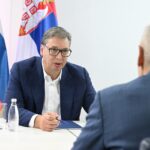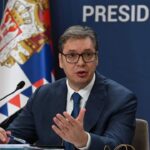- Vulin meets with Putin
Serbian Deputy Prime Minister Aleksandar Vulin met with Vladimir Putin on September 4 on the sidelines of the Eastern Economic Forum in Vladivostok.
At the meeting, Putin pointed out “a decline in the volume of trade turnover, albeit a small one”, and offered to “look at the obstacles that arise in this regard, and eliminate them.” “There are specific things that need to be addressed immediately. I mean, for example, that in March 2025, the term of our gas supply contracts will expire,” Putin noted.
Vulin, in turn, emphasized that Serbia is not only a strategic partner, but also an ally of Russia, adding that, because of this, the pressure on Serbia is “colossal”. “But Serbia, under the leadership of Aleksandar Vučić, is a Serbia that will never become a member of NATO, never impose sanctions on Russia, and never allow any anti-Russian actions to take place on its territory,” he said.
On the eve of Vulin’s meeting with Putin, the European Union issued a statement that maintaining relations with Russia amid its war of aggression against Ukraine is incompatible with EU values and the accession process, and that relations with Russia cannot be normal after Russia’s unprovoked and unjustified war of aggression against Ukraine.
However, Belgrade quite resolutely rejected such accusations.
Prime Minister of Serbia Milos Vucevic said Vulin’s visit to Russia does not represent anything “epic or terrible”. “We did not severe diplomatic relations with the Russian Federation, no one is forbidden to meet with Russian officials,” he said.
It should be noted that the meeting in Vladivostok was the first one held by Serbian high-ranking officials with Putin since February 24, 2022, but not the first one with Russian government officials. However, apart from verbal condemnation, no other measures were taken by the EU towards Serbia in connection with official Serbian-Russian contacts.
- Vučić receives invitation from Putin to BRICS summit in Kazan
The President of Serbia, Aleksandar Vučić, received an invitation from the President of the Russian Federation, Vladimir Putin, to the BRICS summit to be held in Kazan, Russia, on October 23-24.
However, whether he will attend the event remains unclear. The Serbian president avoids directly answering questions about his possible trip to Kazan, citing other important commitments, such as scheduled meetings with foreign officials and commemoration of the 80th anniversary of the liberation of Belgrade.
Vučić promised to update the public on his potential participation in the October 10-15 summit. He has a phone call scheduled with Vladimir Putin, during which the issue will also be raised.
Putin’s invitation to Vučić comes amid ongoing disputes over the direction of Serbia’s foreign policy, which is balancing between Europe and the United States on one side, and Russia and China on the other. Participation or non-participation in the BRICS summit in October should be seen as a test of Serbia’s geopolitical commitment.
- Serbian President Vučić meets with Iran’s ambassador
Serbian President Aleksandar Vučić met with Iranian Ambassador Rashid Hasanpour.
“With Ambassador Hasanpour, I discussed all important and interesting issues in relations between Serbia and Iran. We also discussed the current geopolitical context, the place and role of our countries in international forums,” Vučić wrote on Instagram on September 3.
Vučić’s meeting with the Iranian ambassador came a little over a month after Serbian Deputy Prime Minister Aleksandar Vulin met with Iran’s newly-elected President, Masoud Pezeshkian, in Tehran.
Vulin attended the inauguration as Vučić’s envoy.
Since 2021, Serbia has been strengthening cooperation with Iran despite the fact that Iran is a country sanctioned by the European Union.
In July 2022, the business delegations from Serbia and Iran met in Belgrade to discuss the possibilities of improving cooperation.
Vučić’s meeting with the Iranian ambassador served as yet another contribution to the multi-vector nature of the country’s foreign policy.
- Local elections campaign launched in Bosnia and Herzegovina
The campaign will run from September 6 to 07:00 on October 5, after which the pre-election silence shall be enforced until the polls close at 20:00 on October 6.
A total of slightly more than 3.4 million citizens will be able to vote in the elections on October 6
A total of 142 mayors, or heads of municipalities, will be elected, and the same number of local self-government bodies in municipalities and cities will also be voted in.
Citizens will also elect a new convocation of the Skupstina of the Brcko district in Bosnia and Herzegovina, as a special administrative unit. Then that body shall elect the head of the district.
According to the data from the BiH Central Election Commission, 296 political entities are registered to participate in the elections, of which 110 are political parties and the rest are pre-election blocs, lists of independent candidates, and independent runners. About 26,000 candidates will compete for seats in local self-government bodies. Also, 386 candidates are applying for the posts of mayors or heads of more than 140 local communities.
According to changes to the law on elections, introduced in March by the High Representative of the international community in Bosnia and Herzegovina, Christian Schmidt, those convicted of war crimes shall be banned from running for office.
The BiH Central Election Commission introduced new rules for these elections, laying down fines for violations and tightening controls on hate speech.
The Representation of the European Union in Bosnia and Herzegovina launched a social media campaign called “It all starts with elections”. The campaign focuses on promoting fair elections and preventing fraud, as well as increasing women’s participation in politics.
Local observers expect no drastic changes after the elections on October 6. At the same time, there are no outlooks foreseeing significant security threats or possible destabilization in the country during the election campaign and amid the vote.
- Prime Minister Andrej Plenkovic pays visit to Bosnia and Herzegovina.
Stressing that he chose Bosnia and Herzegovina for his first working bilateral visit during his third prime ministerial mandate, Plenkovic said this sends a message to the public, institutions and all political parties of Bosnia and Herzegovina of the importance of Bosnia and Herzegovina and the desire of the Croatian government to improve relations and resolve pressing issues.
The Croatian Prime Minister emphasized Croatia’s support for BiH’s progress on the European path, stressing the need to amend legislation, ranging from laws on courts and prosecutors to those on migration and border control, as well as the law on elections.
According to the head of government, the election law is of crucial importance for the quality functioning of all institutions of Bosnia and Herzegovina. “We believe that all three constitutional nations should be absolutely equal, which of course includes the Croatian people and their legitimate representation in the highest institutions of Bosnia and Herzegovina,” he said.
According to the Constitution of BiH, the Presidium shall consist of representatives of all three constitutional nations: Bosniaks, Serbs, and Croats. Formally, many Croats do not perceive the Croatian member of the BiH Presidency, Željko Komšić, as their legitimate representative, since he was voted in by a much larger number of Bosniaks.
Statements by Prime Minister Plenkovic about the law on elections in the context of European integration were seen by some media and certain Bosnian politicians as an attempt to interfere in BiH’s urgent affairs and as “an independent change of priorities” defined by the EU for BiH, because changes to the electoral law are not part of the 14 European conditions for launching accession negotiations.
- Serbia plans to bring back compulsory military service
Serbian President Aleksandar Vučić has announced plans to bring back compulsory military draft for men, likely to be launched in a year.
According to the president, men will have to serve for 75 days — two months plus 15 days for training. “This is the minimum that everyone can give to their country,” Vučić emphasized.
He also noted that military service would be compulsory for men and voluntary for women, and that the government would provide “significant monetary compensation” to conscripts.
Vučić added that special conditions will be created for the youths engaged in the IT sector so that they can apply their knowledge for the benefit of the army without undergoing infantry training.
Plans to bring back compulsory military service have drawn criticism from Serbia’s opposition, who have questioned its feasibility. Many believe such measures are part of Vučić’s political strategy aimed at strengthening his power and influence.
However, other observers consider Belgrade’s decision to be part of the regional trend towards militarization due to the general deterioration of the regional military and political situation.
Earlier, Croatia decided to bring back two-month mandatory military service from January 1, 2025.



